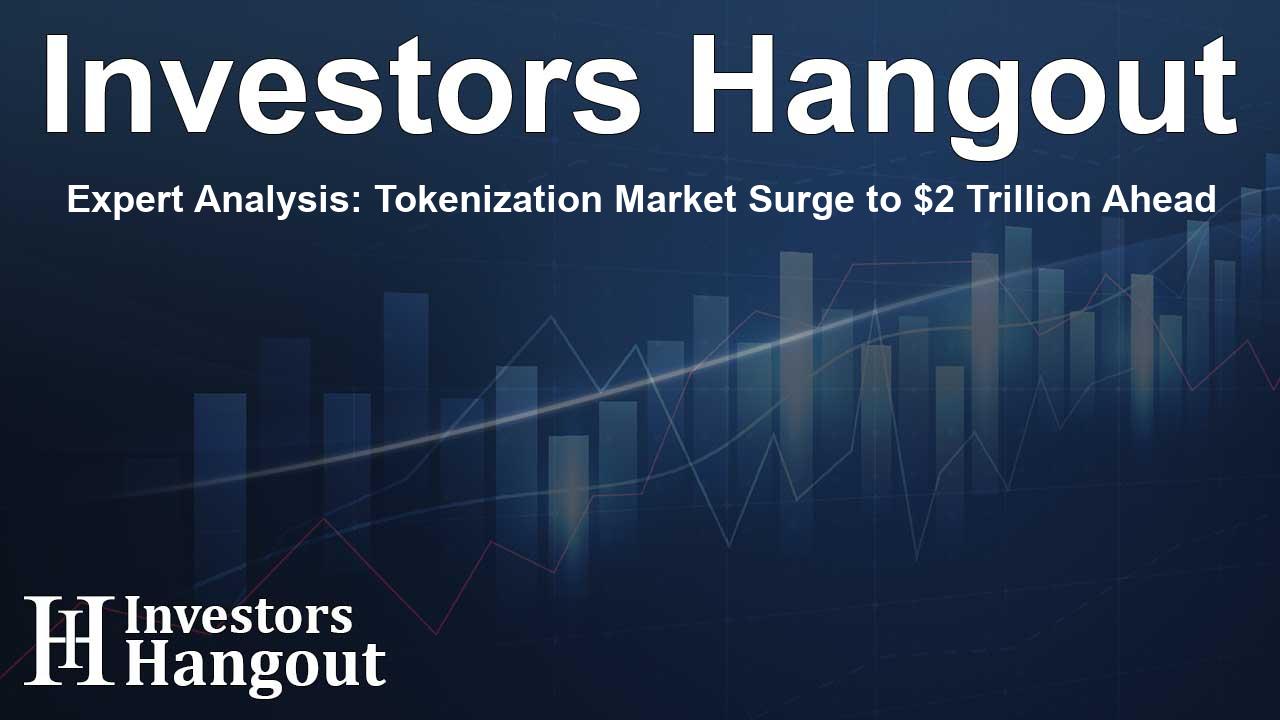Expert Analysis: Tokenization Market Surge to $2 Trillion Ahead

Understanding the Potential of Tokenization Market Growth
The landscape for crypto-backed tokenized assets is rapidly evolving, and experts believe this market could surpass $2 trillion over the next five years. This expansion is largely attributed to the robust infrastructure being developed by major institutions and regulatory bodies to foster integration into global finance. Ritesh Kakkad, Co-Founder of XDC Network, anticipates that the momentum gained in recent months will only expedite this remarkable growth.
The Emergence of Stablecoins
Among the various forms of tokenized assets, stablecoins are emerging as the most established category. Stablecoins, which are typically pegged to real-world currencies, are expected to increase in market value significantly, from approximately $256 billion today to nearly $2 trillion by 2028. Kakkad highlights this trend as a critical indicator of the market's maturation and potential.
The Role of Major Financial Institutions
Notably, many prominent asset managers and banking institutions are jumping into the tokenization arena. Organizations like BlackRock, Bank of America, and Coinbase are developing innovative financial products, including tokenized equity and money-market funds. For instance, BlackRock has introduced BUILD Funds, which merge on-chain capabilities with traditional money market mechanisms.
Regulatory Support as a Catalyst
The integration of policy frameworks and streamlined regulations has been pivotal in advancing tokenization. Countries such as the U.S., U.K., and Singapore are at the forefront of crafting regulations that promote a crypto-friendly environment, provoking interest from global investors. Kakkad attributes this regulatory progress to an increasingly favorable business environment that encourages growth and innovation in the crypto space.
Global Regulatory Developments Impacting Tokenization
The EU's recent introduction of the Markets in Crypto-Assets (MiCA) regulation has created a promising landscape for tokenization, delivering technological certainty that appeals to investors worldwide. In the U.S., the White House's roadmap for crypto policy reinforces the push towards tokenization and blockchain innovation, signifying a united effort to tap into this transformative market.
The Concept of Tokenization
Tokenization enables the fragmentation of high-value assets into smaller, tradeable tokens, allowing for fractional ownership across various sectors such as real estate, private equity, and art. Kakkad emphasizes that the transparency associated with blockchain technology—the permanent logging of ownership on an immutable ledger—fosters trust and significantly enhances market accessibility.
Advantages of Tokenized Assets Over Traditional Ones
Tokenized assets provide multiple advantages over their traditional counterparts. They offer lower entry costs, superior liquidity, quicker cross-border settlements, and enhanced auditability. Furthermore, smart contract programmability enables seamless integration into existing financial protocols, showcasing the future potential of digital assets.
The Expanding Institutional Use Cases
As analysts project a growing presence of digital assets in sectors such as repo markets, collateralized lending, and treasury operations, major initiatives are already underway. The launch of JP Morgan's Kinexys platform and Singapore's Canton Network, featuring tokenized bonds and commodities, are notable examples of transformative efforts in the financial landscape.
Democratizing Investment Opportunities
Kakkad mentions that crypto-enabled tokenization is significantly democratizing investment opportunities. With online access, individuals can now partake in investments with amounts as modest as hundreds or even tens of dollars. This shift not only levels the playing field but also expands wealth accessibility to a broader audience.
Building Regulations for Cross-Border Interoperability
Enhanced cooperation among regulatory bodies like IOSCO and the Financial Stability Board is crucial in establishing frameworks that promote interoperability across borders. The aim is to facilitate the movement of tokenized assets between nations, varied blockchains, and diverse investor demographics, thereby enhancing market efficiency globally.
Frequently Asked Questions
What is tokenization?
Tokenization refers to the process of converting high-value assets into smaller, tradeable tokens, enabling fractional ownership.
Why are stablecoins significant in the tokenization market?
Stablecoins are crucial as they represent the most mature segment of tokenized assets and are expected to see significant market growth.
How do regulations impact tokenization?
Clear regulatory frameworks provide the necessary support for advancements in tokenization, reducing uncertainty for investors and institutions.
What advantages do tokenized assets offer over traditional investment?
Tokenized assets offer lower entry costs, increased liquidity, faster settlements, and transparency compared to traditional investments.
What role does blockchain play in tokenization?
Blockchain technology enhances transparency and trust by permanently logging ownership and transaction history on an immutable ledger.
About The Author
Contact Olivia Taylor privately here. Or send an email with ATTN: Olivia Taylor as the subject to contact@investorshangout.com.
About Investors Hangout
Investors Hangout is a leading online stock forum for financial discussion and learning, offering a wide range of free tools and resources. It draws in traders of all levels, who exchange market knowledge, investigate trading tactics, and keep an eye on industry developments in real time. Featuring financial articles, stock message boards, quotes, charts, company profiles, and live news updates. Through cooperative learning and a wealth of informational resources, it helps users from novices creating their first portfolios to experts honing their techniques. Join Investors Hangout today: https://investorshangout.com/
The content of this article is based on factual, publicly available information and does not represent legal, financial, or investment advice. Investors Hangout does not offer financial advice, and the author is not a licensed financial advisor. Consult a qualified advisor before making any financial or investment decisions based on this article. This article should not be considered advice to purchase, sell, or hold any securities or other investments. If any of the material provided here is inaccurate, please contact us for corrections.
